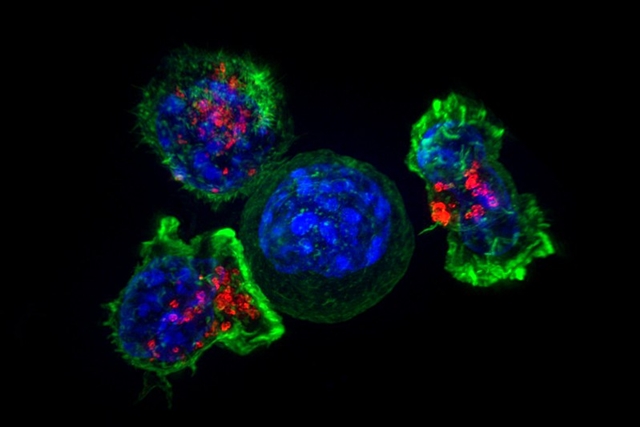10 Jan. 2023. A bioengineering team devised techniques for feasibly adding cancer-killing enzymes to engineered immune cells that in lab mice kill solid-tumor and blood cancer cells. Researchers from the cell and tissue engineering lab of David Mooney at Harvard University and colleagues from Dana-Farber Cancer Institute in Boston describe their process in the 28 Dec. 2022 issue of Proceedings of the National Academy of Sciences (paid subscription required).
Mooney and colleagues are seeking ways to improve the clinical response of T-cells from the immune system, genetically altered to express chimeric antigen receptors, also known as CAR T-cells. These engineered T-cells are designed to help find and destroy cancer cells that would normally evade attack by the immune system. CAR T-cells have so far produced mixed results in treating cancer patients, with somewhat greater success as a therapy for blood-related cancers such as lymphoma, than solid-tumor cancers. With solid tumors, CAR T-cells are still limited by the tumor microenvironment, a network of tissue and blood cells that protects tumors.
A technique for enhancing CAR T-cells is further engineering the cells by adding cytokines, enzymes in the immune system with cancer-killing properties. While technically possible, adding cell-destroying cytokines directly to T-cells, say the authors, increases risks of serious adverse effects in patients, making the approach not feasible under most conditions. Mooney’s lab at Harvard’s engineering school and Wyss Institute studies biomaterials that affect cell and tissue functions, including design of new materials for aiding cancer therapies.
The team led by Yutong Liu, a doctoral candidate in Mooney’s lab, adapted methods from nanotechnology and chemistry to add cytokines to CAR T-cells in low, safe doses, by leveraging cells’ natural metabolism of sugar. The researchers first deliver a chemically reactive type of sugar with nanoscale particles to T-cells in lab cultures. The team then uses click chemistry, techniques for identifying or designing molecular connections, to link modified cytokine molecules to the reactive sugar residing in the T-cells. Discoverers of click chemistry won the 2022 Nobel Prize for chemistry.
Compatible with today’s cell manufacturing techniques
This method for adding cytokines, say the authors, allows for localized delivery of the cancer-killing enzymes, making them safer for patients. “Only having to add sugar-containing nanoparticles and later the cytokines to the culture media,” says Liu in a Wyss Institute statement, “makes the method extremely simple and fully compatible with the adoptive cell manufacturing pipeline.”
The team tested their technique with lab mice induced with the aggressive skin cancer melanoma, using engineered CAR T-cells enhanced with the anti-tumor cytokine interleukin-12. Results show enhanced CAR T-cells delay progression of melanoma tumors and extend mice lifetimes by 50 percent, with doses that would be too low to be effective for non-enhanced CAR T-cells. Findings also show a broader immune response, with a wider variety of immune system cells generated in test animals.
The researchers also tested the technique in mice induced with the blood cancer lymphoma. Those results show CAR T-cells enhanced with interleuken-12 cytokines stopped the progression of lymphoma cells and extended lifetimes in test mice, also in doses that would be too low to be effective if not enhanced.
The authors believe their techniques can be adapted quickly for clinical use. “Our approach,” notes Mooney, “can be easily scaled and integrated with the processes currently used to manufacture therapeutic T-cells, including CAR T-cells, and thus could have a relatively short path into clinical application.” The authors report the university applied for patents on the technology with Liu and Mooney among the inventors.
More from Science & Enterprise:
- Protein Chemistry Biotech Gains Collaboration, Venture Funds
- Peptide Discovery Company to Gain $3.3B in Licensing Deals
- Trial Shows Gel Clears Common Skin Cancer Wounds
- Biotech, M.D. Anderson Partner on Precision Drug Design
- Dual-Action Vaccine Shown to Attack, Shrink Solid Tumors
We designed Science & Enterprise for busy readers including investors, researchers, entrepreneurs, and students. Except for a narrow cookies and privacy strip for first-time visitors, we have no pop-ups blocking the entire page, nor distracting animated GIF graphics. If you want to subscribe for daily email alerts, you can do that here, or find the link in the upper left-hand corner of the desktop page. The site is free, with no paywall. But, of course, donations are gratefully accepted.
* * *


 RSS - Posts
RSS - Posts
You must be logged in to post a comment.